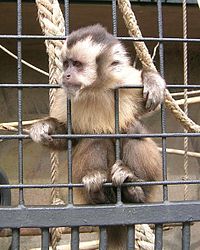Captivity (animal)

Captivity is when an animal, like a lion or a dolphin or an elephant, is kept inside a closed area instead of living freely in nature. This area could be a cage, a tank, or an enclosure.
Animals in captivity may have limitations to their food sources, shelter, and space to move around. They are fed and cared for by humans, but they cannot hunt or search for their own food like they would in the wild. They may not have the same social structures as they would in the wild and may not be able to mate and reproduce naturally. This can sometimes make the animal feel lonely or frustrated, which can cause them to act differently than they would in the wild.
Furthermore, living in a cage may restrict their movements and prevent them from exercising and enjoying other natural behaviors, which can lead to health problems.
While some animals are well cared for by humans in captivity, and thrive in captivity, others do not adapt well and experience poor living conditions. That is why it is important to make sure that the animals kept in captivity have decent housing, proper food, medical care, and living conditions that allow them to move and perform natural behaviors safely. In addition, people should also consider the ethical considerations of keeping animals in captivity, and whether their needs outweighed by the specific benefits their captivity provides, such as for education or conservation.
Animals in captivity may have limitations to their food sources, shelter, and space to move around. They are fed and cared for by humans, but they cannot hunt or search for their own food like they would in the wild. They may not have the same social structures as they would in the wild and may not be able to mate and reproduce naturally. This can sometimes make the animal feel lonely or frustrated, which can cause them to act differently than they would in the wild.
Furthermore, living in a cage may restrict their movements and prevent them from exercising and enjoying other natural behaviors, which can lead to health problems.
While some animals are well cared for by humans in captivity, and thrive in captivity, others do not adapt well and experience poor living conditions. That is why it is important to make sure that the animals kept in captivity have decent housing, proper food, medical care, and living conditions that allow them to move and perform natural behaviors safely. In addition, people should also consider the ethical considerations of keeping animals in captivity, and whether their needs outweighed by the specific benefits their captivity provides, such as for education or conservation.
Related topics others have asked about:
